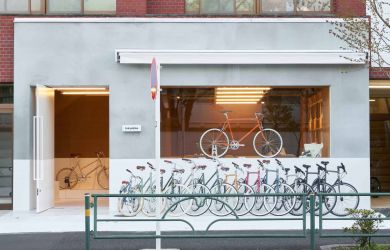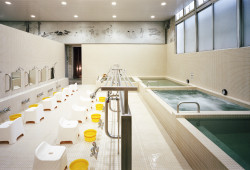
Originally published on metropolis.co.jp on April 2009

Photo by James Hadfield
Dachibin is the golden child of a group of family-run Okinawan eateries clustered around a shopping arcade on the north side of the station. The oldest member of the clan, Kiyoka—squirreled away down a tiny alley near KFC—is pushing 50, while Dachibin itself will be celebrating its 30th anniversary in August.
It’s a restaurant where the atmosphere is, if anything, as big a draw as the food. The staff, all decked out in traditional Okinawan work garb, are possessed of an ebullience that puts the average Hare Krishna to shame. A glance around the interior reveals rows of awamori bottles and dog-eared Polaroid snaps of good times past. Customers can sit at a well-worn bar that snakes along the kitchen counter, and there are tables and floor seating at the back, where you might end up wedged in alongside other groups of diners.
That’s where we find ourselves as we tuck into some goya chanpuru (¥735), a stir-fry of bitter melon, pork and hunks of tofu scrambled with eggs. The eggs soften the bitterness somewhat, and the seasoning pitches things closer to Taiwanese than mainland Japanese cuisine. Bottles of awamori infused with habanero chili are provided to lend an added kick.
We follow up with another Okinawan staple, umi-budo (¥525), a delicate kelp with bubble-like pods that dissolve in the mouth. It’s not the most flavorsome of dishes, but the sensation is sufficiently odd to recommend it. Rafuti (¥840), succulent chunks of pork belly stewed in awamori, miso and soy sauce, is a lot more substantial, as is the sunui tempura (¥735), which is made with mozuku seaweed and strangely reminiscent of an onion bhaji. The papaya salad (¥682), meanwhile, comes doused in a sour, spicy dressing that feels plucked straight from a Thai street market.
The option of draft Orion beer (¥577) makes for a welcome change from the usual Asahi and Suntory served up in most izakaya, but it isn’t really much of an improvement. We plump instead for some bottles of Ishigakijima (¥682), a robust microbrew that’s far more entertaining company. Later, we ask for a recommendation from the 20 varieties of awamori on offer and end up with a couple of glasses of Maruta (¥525), which slips down very smoothly indeed. Looking at the menu, we note that Dachibin also offers a “bottle keep” service for regular customers. It’s starting to look mighty tempting.







